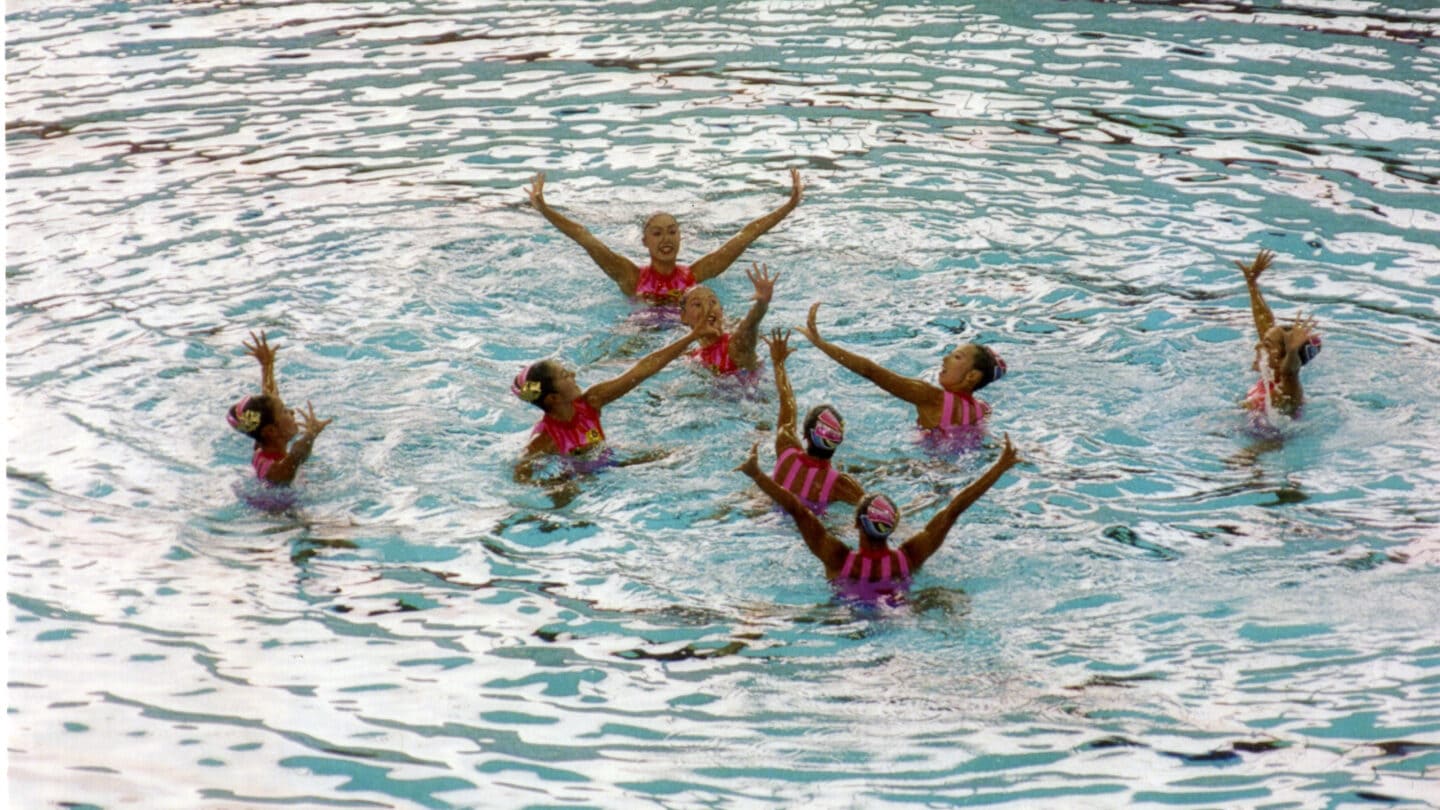
Japanese synchronized swimming team during free routine. 1996 marked the first time that synchronized swimming was a team event at the Olympic Games. | John Rossino, photographer, Atlanta, July 30, 1996. Georgia Amateur Athletic Foundation Collection, Kenan Research Center at Atlanta History Center.
Every Olympic and Paralympic Games is filled with memorable moments. The athletes, their backgrounds, and the competitions make it into history books, tug at our hearts, change the way a sport is played, and leave all who watch with favorite stories.
Atlanta’s Games included legendary athletes, intense rivalries, and exciting underdogs—the iconic moments are too many to name. We’ve collected a few of our favorites from the summer of ‘96.
Firsts
New Participants
A whopping 24 nations made their Olympic debut during the summer of ‘96, introducing the world to new countries. The group included the last of the 15 ex-Soviet Republics to make their debut as independent countries. After the official dissolution of the U.S.S.R., many of the ex-Soviet states joined together under what was called the Unified Team at the Barcelona Games in 1992.
By the next summer Games in Atlanta, all nations participated under their own flags. The first-time participant group also included Palestine and several small nations, such as São Tomé, Príncipe, and Nauru. For the first time in Olympic history, all invited National Olympic Committees (197 of them) sent participants.
Athletes from 10 of the 24 new participants won medals.
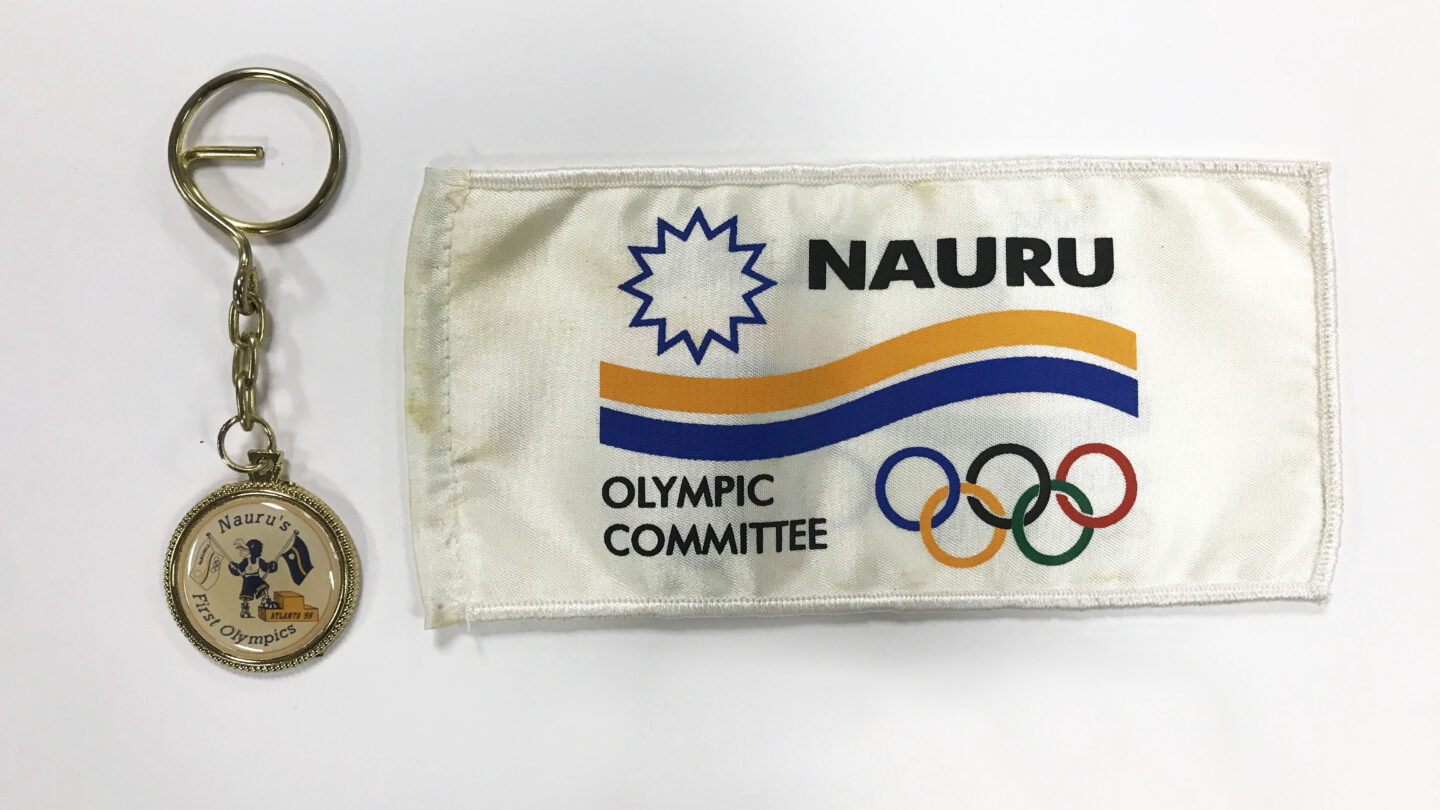
Commemorative keychain and ribbon. | Nauru Olympic Committee, circa 1996. Gifts of Georgia Amateur Athletic Foundation, 2002.
New Sports
With nearly every Games, the Olympic program changes, adding new sports or new variations and trying out possible additions for the future as “demonstration events.” For the ’96 Olympic Games, beach volleyball, mountain biking, lightweight rowing, and women’s football [soccer] were added. Several of these offerings required the organizers to plan for new types of venues and courses.
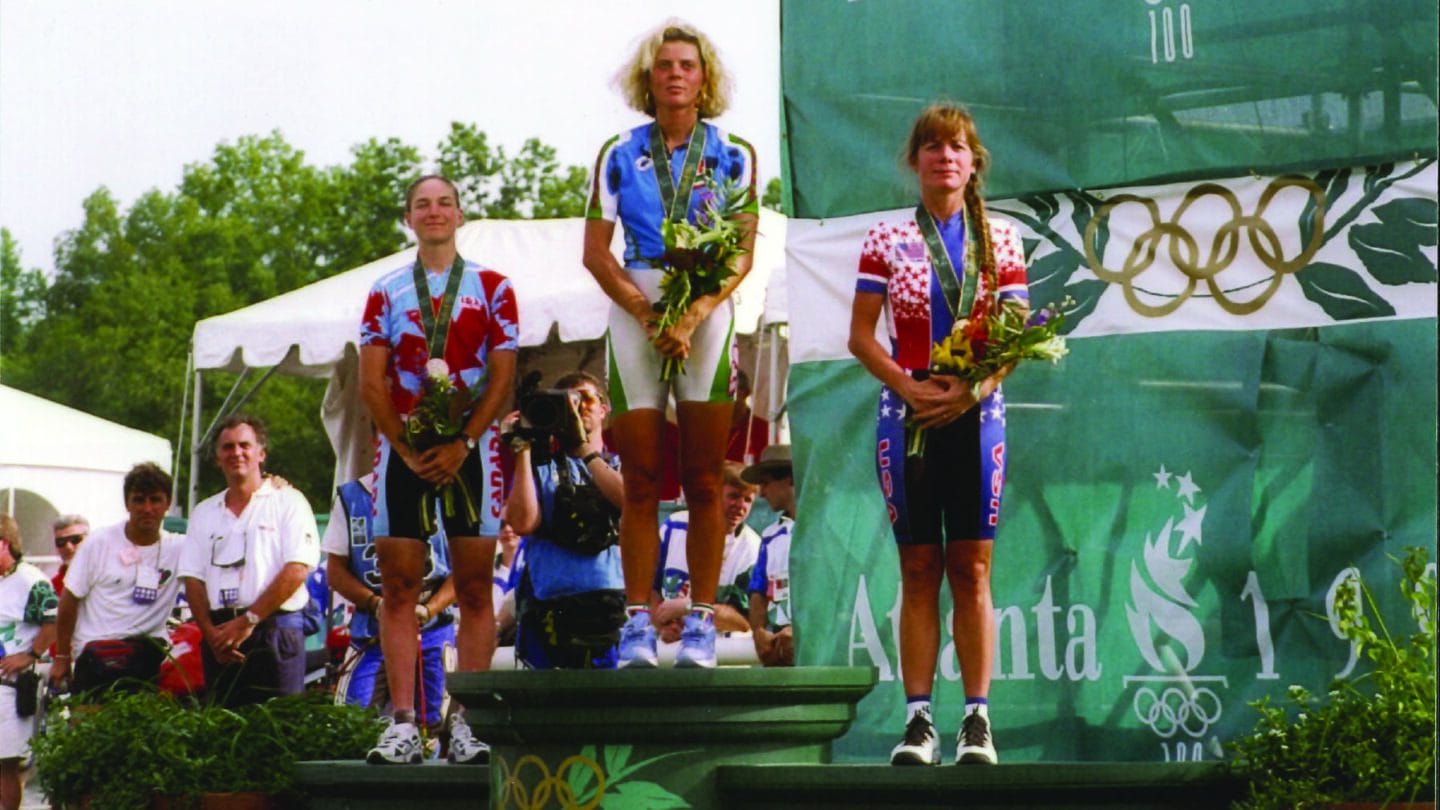
Winners of the Women’s Mountain Bike competition on the podium: (l-r) Alison Sydor (Canada), Paola Pezzo (Italy), Susan DeMattei (USA). | Unidentified photographer, Conyers, Georgia, July 30, 1996. Georgia Amateur Athletic Foundation Collection, Kenan Research Center at Atlanta History Center.
New Inclusivity
The Paralympic Games organize competitors into different disability classifications for competition. These classifications cluster athletes together by the similarity of their impairments for fair competition. Prior to the Barcelona Games in 1992, athletes with intellectual disabilities were barred from participation. In 1992, a separate Paralympic Games for Persons with Mental Handicaps was held in Madrid.
The ’96 Games marked the first time that athletes with intellectual disabilities competed for full medal status in the Paralympic Games. This inclusion was short-lived. Controversies over the status of intellectually disabled athletes and accusations of cheating during the 2000 Paralympics resulted in the removal of these events from the program until 2012. The ’96 Paralympic Games included many other firsts, including athletic achievements and the increased scale of the events.
Paola Fantato, Olympian and Paralympian, Italy. Paola Fantato was the first athlete to compete in the Olympic and Paralympic Games in the same year. | Simon Kornblit, photographer, Atlanta, July 29, 1996. Georgia Amateur Athletic Foundation Collection, Kenan Research Center at Atlanta History Center.
Rivalries
Who is the Fastest?
Sprinters Michael Johnson (U.S.A.), Donovan Bailey (Canada), and Marie José Pérec (France) all received press attention as drama on the track played out in 1996. Johnson came to the ’96 Olympic Games with multiple years of world championship wins, vowing to become the first male athlete to win Olympic gold medals in both the 200m and 400m races.
Donovan Bailey’s journey to the Olympic gold was less heralded than Johnson’s. While Johnson had run for Olympic gold in 1992, Bailey was still working part time as a stockbroker. Bailey finished first in the 1995 World Championship in the 100m sprint and 4x100m relay, yet he was still a relative newcomer to international competition by the time he arrived in Atlanta.
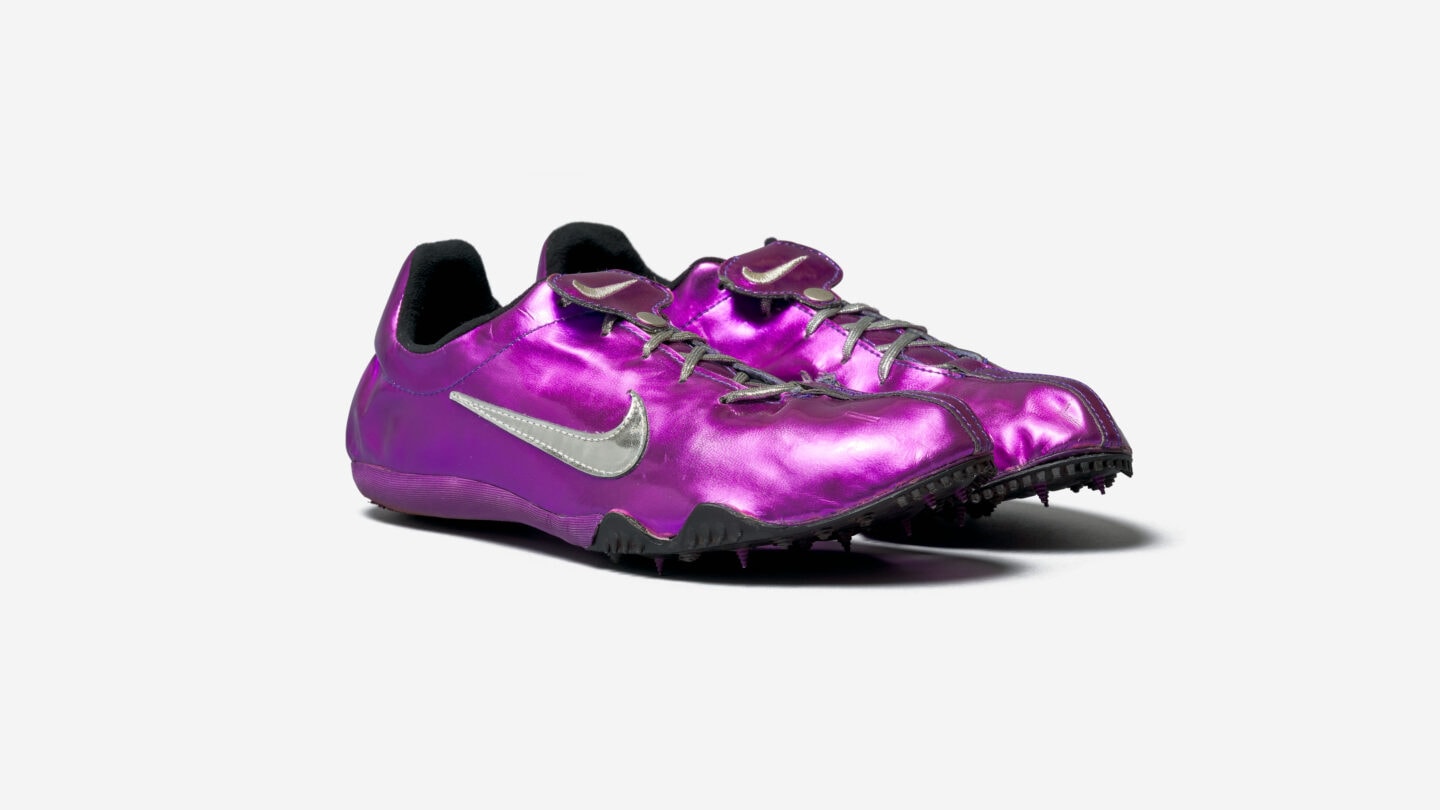
Track spikes, U.S. Olympic track and field trials. Michael Johnson, Olympian, U.S.A. | Nike, Beaverton, Oregon, 1996. Gift of Michael Johnson, 2010.
Famously racing in his metallic gold Nikes, Michael Johnson won both his races, including a 19.32 time in the 200m race that shattered his own previous world record by 3-tenths of a second, establishing himself as the World’s Fastest Man—sort of.
With defending Olympic champion Linford Christie (Great Britain) disqualified due to two false starts, Donovan Bailey surged to the Olympic gold medal and world record in the 100m race—a win that more often comes with the title of World’s Fastest Man. He added a second gold medal as anchor of the Canadian 4x100m relay team.
A press-fueled rivalry erupted between Bailey and Johnson over who would receive the unofficial superlative of fastest man—a matter that would ultimately be addressed in a 150-meter race between the two sprinters the next year. Bailey won.
French sprinter Marie José Pérec matched Michael Johnson’s accomplishment. She completed an Olympic double, winning gold in the 400m and 200m just days before Johnson. Pérec’s Atlanta win made history—she holds the rare achievement of winning back-to-back Olympic gold medals in the 400m race (in Barcelona and Atlanta).
Balkan Tensions. The ’96 Games took place between major conflicts and nationalist tensions that led to the eventual breakup of Yugoslavia. Political turmoil came to the pool as the Serbian and Montenegrin athletes, under the flag of the Federal Republic of Yugoslavia, competed against Croatia in a quarterfinal round.
The competition took place not long after the conclusion of a devastating four-year war for Croatian independence. Athletes and fans brought the emotions and opposition of the tragic events from their common history to global audiences. Croatia won the match and would win the silver medal.
The Magnificent Seven
A new era for women’s Olympic gymnastics was solidified in the summer of ’96. The U.S.S.R. and satellite Soviet states had dominated the events for nearly 50 years, winning the gold medal in the team all-around at every Olympic Games since 1948. However, the dissolution of the Soviet Union in the early 1990s created an opening for other nations to compete.
The U.S. women’s all-around team, featuring Amanda Borden, Amy Chow, Dominique Dawes, Shannon Miller, Dominique Moceanu, Jaycie Phelps, and Kerri Strug, received press in advance of the Games, and the public believed they might bring the U.S. its first women’s all-around team gold medal. The competition was fierce against Russia and Romania.
In the final event, the vault, Kerri Strug famously managed to stick her landing despite seriously injuring her ankle on a previous attempt. Deemed the Magnificent Seven the team was successful in their quest and clinched the gold. Dawes was the first African American woman to win an individual Olympic medal in gymnastics. She and other members of the team added to the U.S. medal count with individual victories.
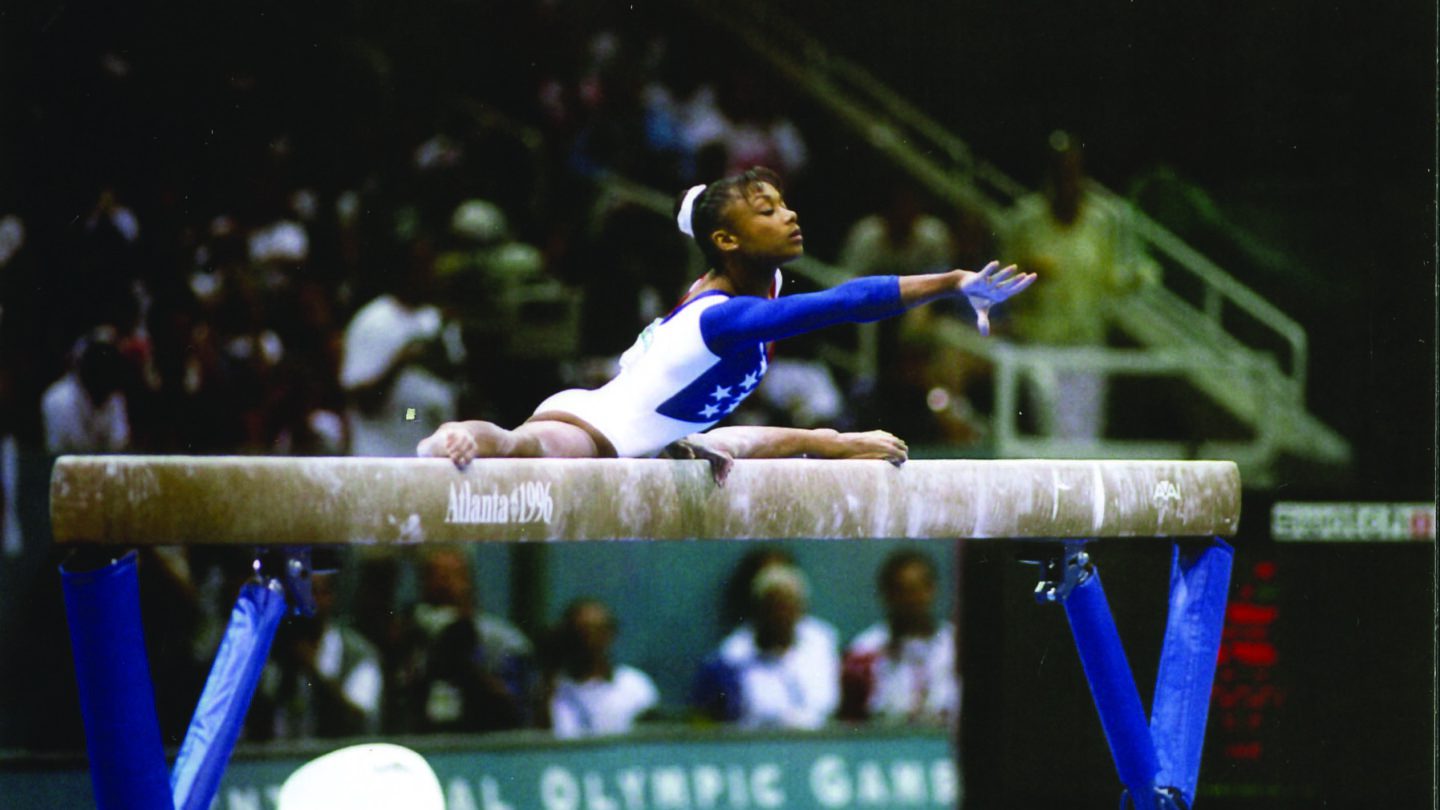
Dominique Dawes, Olympian, U.S.A. | Stephanie Klein-Davis, photographer, Atlanta, July 23, 1996. Georgia Amateur Athletic Foundation Collection, Kenan Research Center at Atlanta History Center.
Legends
Carl Lewis
Crowned as one of the greatest athletes of all time coming well before the ’96 Games, Lewis came to Atlanta with rumors of it being his last international competition. At the age of 35, Lewis’ prospects were daunting, and his competition was stiff. He competed against world record holder Mike Powell and defending world champion Ivan Pedroso. Injuries took both athletes out of the competition, leaving Lewis to duel with long jumpers nearly 15 years his junior.
While Lewis’ 8.50m leap did not match his legendary soaring standards, it was enough to push him past his competitors and toward his ninth and final Olympic gold medal. His gold in Atlanta was his fourth consecutive Olympic win in the sport, a claim to fame that is matched by a handful of athletes across the world.
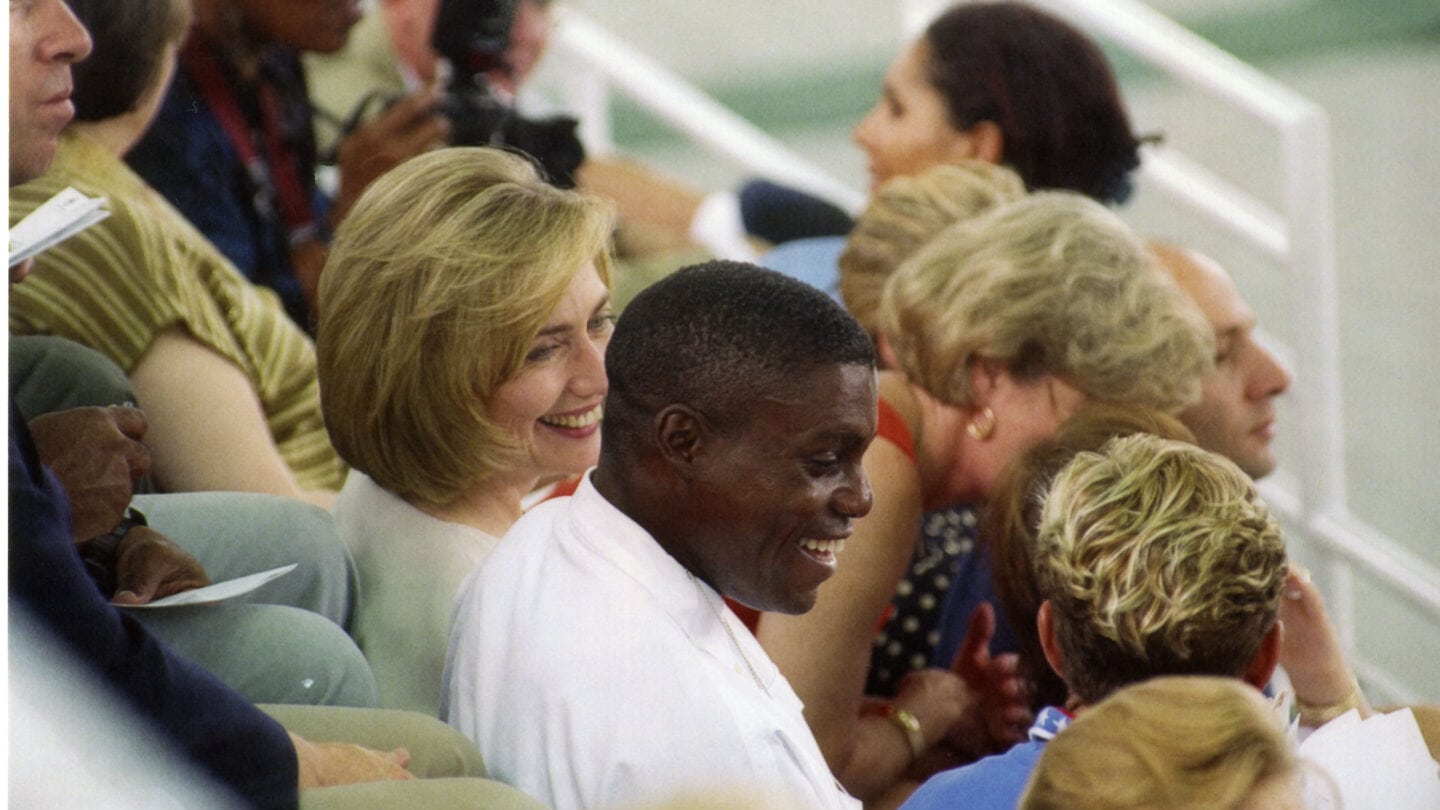
Carl Lewis and Hillary Clinton in the bleachers. | Unidentified photographer, Atlanta, circa August 1996. Georgia Amateur Athletic Foundation Collection, Kenan Research Center at Atlanta History Center.
Tischa Zorn
Alongside Olympic legends, swimmer Trischa Zorn came to Atlanta to add to her long list of medals. She secured gold medals in the 100m backstroke and 200m individual medley as well as three silver and three bronze medals in additional individual and relay events. This brought her career total to a surprising 46 gold medals across 5 Paralympic Games. She returned to compete in the 2000 and 2004 Paralympic Games winning additional silver and bronze medals.
Her record still stands as the most decorated athlete in Paralympic history.
JJK
Along with Carl Lewis, another track and field idol said her goodbyes to competition at the ’96 Games—Jackie Joyner-Kersee. By ’96, Joyner-Kersee had dominated the women’s heptathlon and the long jump for nearly a decade. She held the world record for the heptathlon and the Olympic record for the long jump (records she still holds, by the way) along with three gold medals.
By ’96, however, the 34-year-old was in the twilight of her athletic career. Despite a hamstring injury that forced her to drop out of the heptathlon finals, she chose to compete in the long jump for the opportunity to win her final Olympic medal. After several weak, uneven jumps Joyner-Kersee managed a 7.00m leap on her final attempt, edging her way to the bronze medal, the final medal of a storied Olympic career.
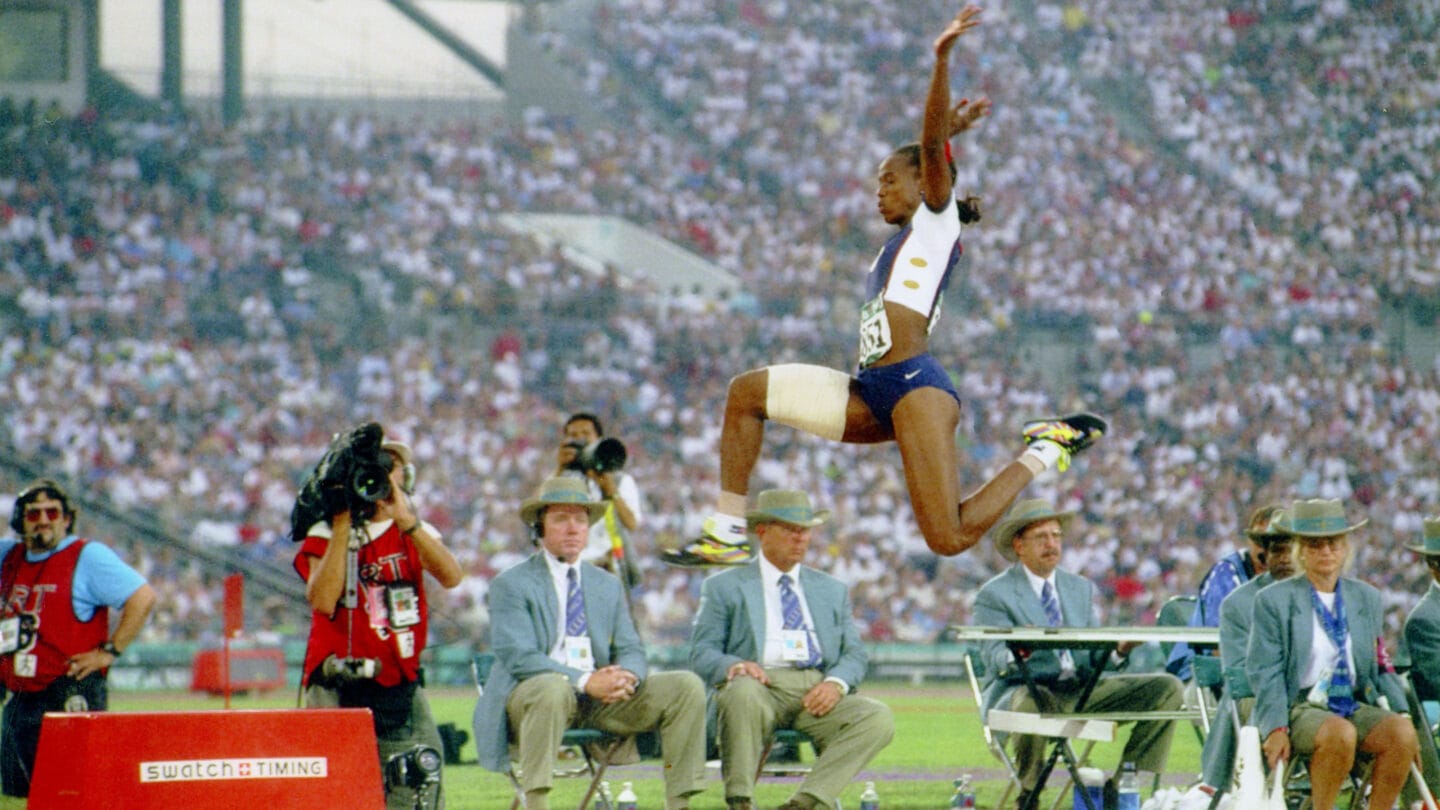
Jackie Joyner-Kersee, Olympian, U.S.A. | Theresa Montgomery, photographer, Atlanta, August 2, 1996. Georgia Amateur Athletic Foundation Collection, Kenan Research Center at Atlanta History Center.
Hou Bin
China’s Hou Bin won his first Paralympic gold medal in the high jump in Atlanta, with a leap of 1.92 meters, nearly breaking the world record in the process. He went on to defend his Paralympic title by winning gold medals in 2000 and 2004.
Although he retired before the 2008 Paralympic Games in Beijing, he was given the ceremonial honor of lighting the flame during the opening ceremony, hoisting his body and wheelchair weight up a rope to the top of the cauldron with only his arm strength.
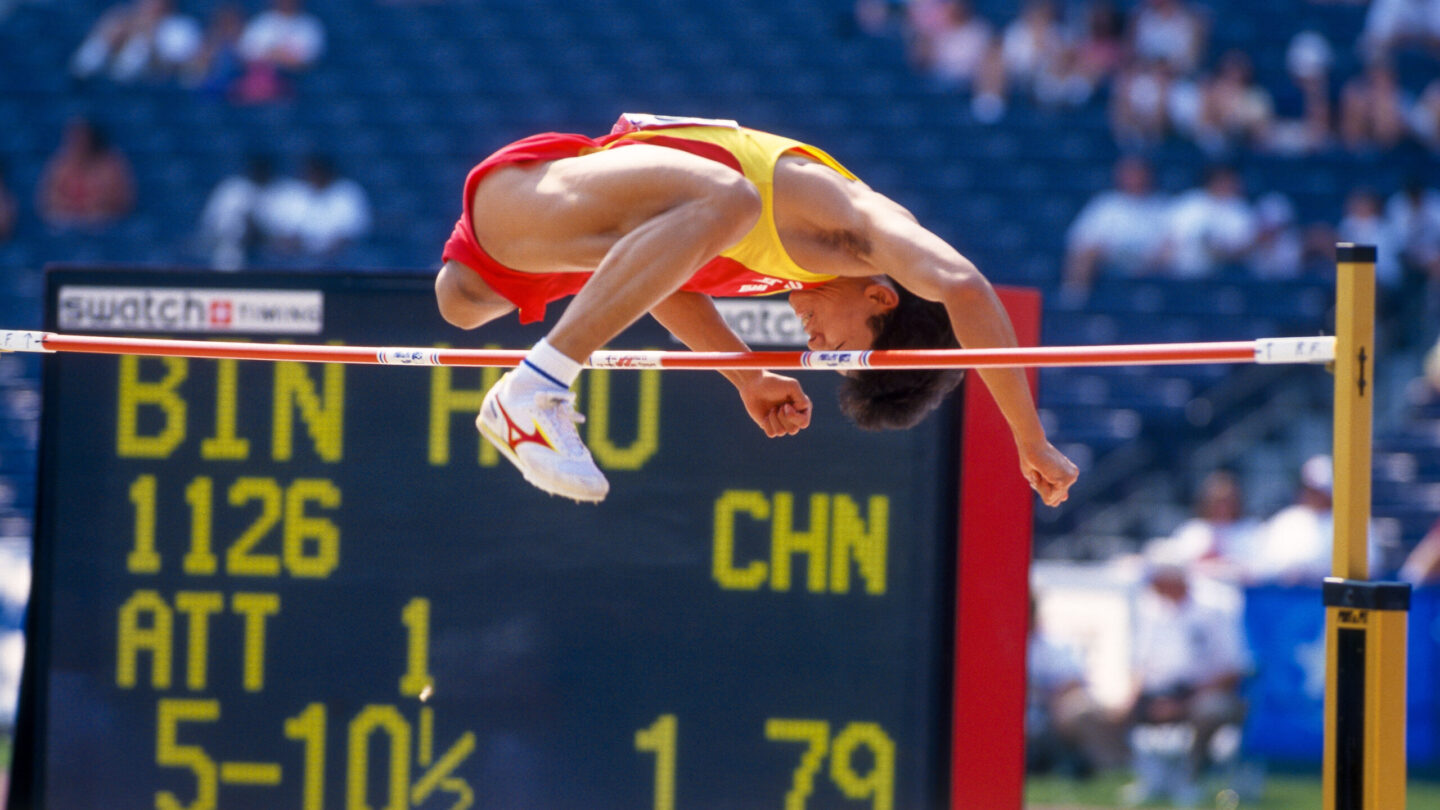
Hou Bin, Paralympian, China. | Chris Hamilton, photographer, Atlanta, circa August 1996. Courtesy Chris Hamilton Photography.
Underdogs
A Dream Team from Down Under
During the ’96 Paralympic Games, the U.S. men’s wheelchair basketball team was expected to dominate the competition much as their Dream Team counterparts had dominated in the Olympic Games. They won the previous two Paralympic gold medals (though a doping scandal forced them to forfeit their 1992 gold medals). The high expectations seemed justified, as the U.S. team dominated their opponents on the group stage.
However, dreams of an Olympic three-peat were dashed in the semifinal match, as the potent U.S. offense was stifled by the strong defense of the Australian national team. The U.S. team won bronze, while the Australian men took gold.
The Ultimate Upset
Prior to ’96, no African nation had ever reached the final match of an Olympic football [soccer] tournament, let alone win a gold medal. However, the Nigerian men’s national team made a thrilling Cinderella run to Olympic history in Atlanta. Down 3-1 against the highly favored Brazilian squad at halftime of the semifinal game, Nigeria stormed back to tie deep into regulation time and then clinched the victory with a final goal to win 4-3. In the gold medal match, Nigeria once again found themselves down against another highly favored opponent (Argentina), only to tie and then win the game on another last-second goal.
Nigeria’s unexpected gold medal win against traditionally strong football teams elevated the players to hero status. The country’s win came during a politically trying time of military dictatorship, under which the team itself was restricted from participation in championship events. As of 2020, Nigeria remains the only African nation to win an Olympic gold medal in soccer.
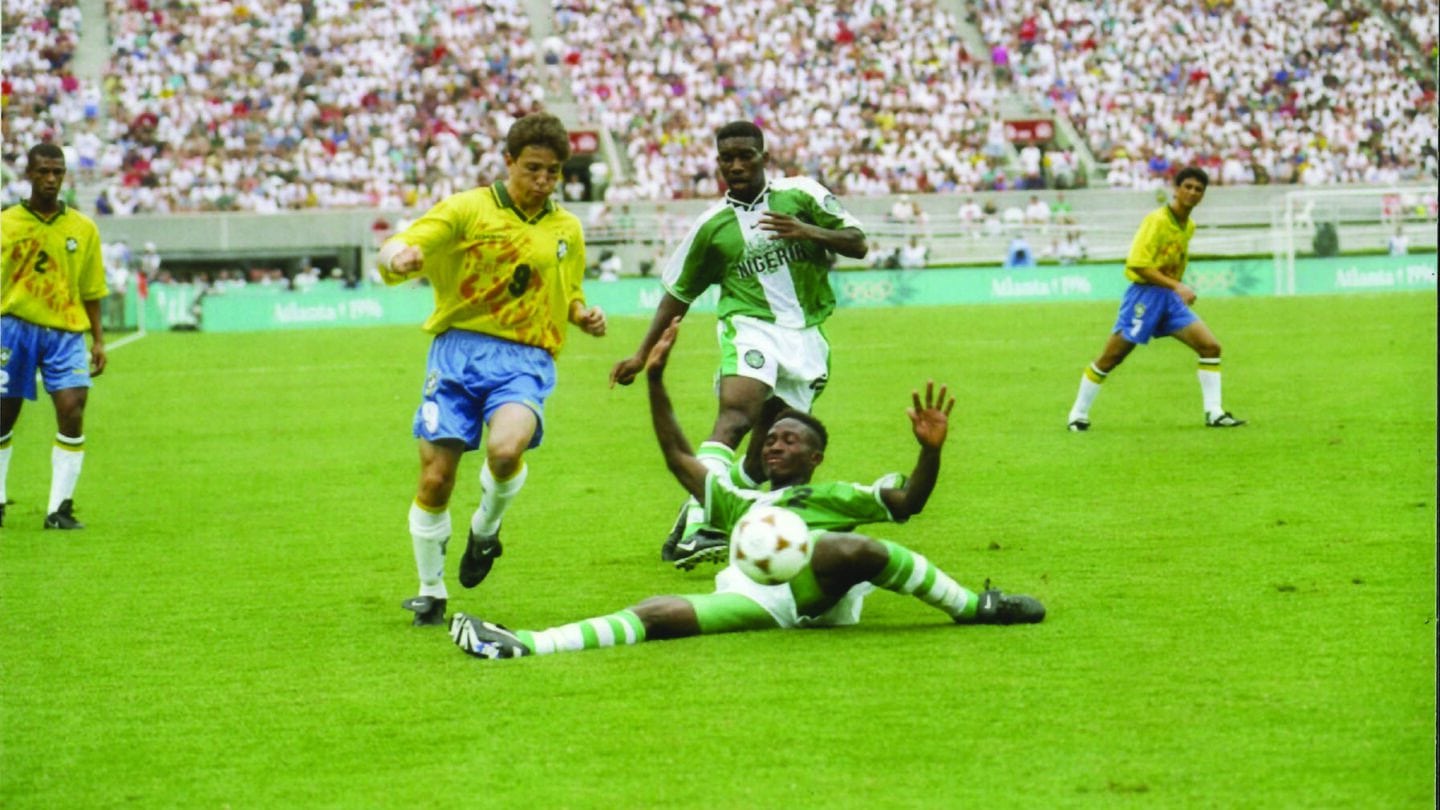
Nigeria vs. Brazil, Football [soccer]. | Mandi Wright, photographer, Athens, Georgia, July 31, 1996. Georgia Amateur Athletic Foundation Collection, Kenan Research Center at Atlanta History Center.
Popular New Professionals
In the summer of ’96, U.S. women dominated team sports. Of course, the legendary Magnificent Seven got heavy press, but their feat was matched by several other teams. Both the U.S. Women’s 4x100m and 4x400m relay teams were victorious in their pursuit of gold medals on the track. The U.S. softball team won the inaugural gold medal against China, partly thanks to a two-run homer by Dot Richardson.
Yet, it was major victories by the U.S. women’s soccer and basketball teams that led to massive viewership during the Games as well as advancements on the professional stage. The U.S. women’s basketball team dominated their opponents on the way to a gold medal, beginning an undefeated streak in Olympic play that remains ongoing 25 years later.
Their popular success during the Games lead to two competing efforts to establish a national women’s professional league—first the American Basketball League (ABL) and the Women’s National Basketball Association (WNBA). Members of the Olympic team went on to successful professional careers, either on the court or coaching. In the inaugural Olympic women’s soccer tournament, the U.S. team defeated China before 75,000 fans for the gold medal. The success convinced the organizers of the 1999 Women’s World Cup in the U.S. to move the matches into much larger venues, setting the stage for one of the most successful women’s sporting events in history.
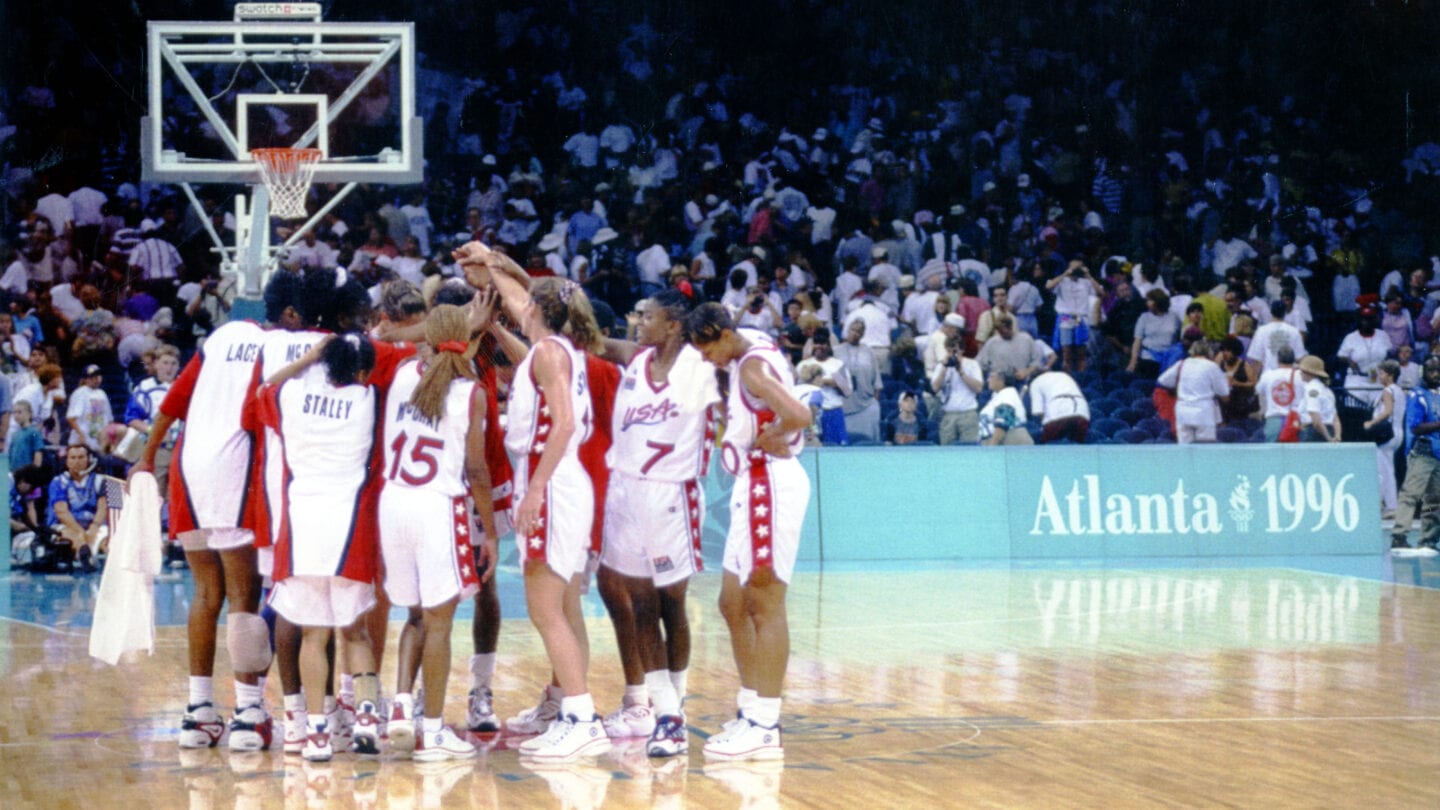
U.S. Women’s basketball team on the court. | Stephanie Klein-Davis, photographer, Atlanta, August 4, 1996. Georgia Amateur Athletic Foundation Collection, Kenan Research Center at Atlanta History Center.
As the Games continue, athletes add to their stories and close chapters of their career, changing international relations find their way into new competitions, and new memorable moments hit television screens.
Learn more about 1996’s most iconic moments at our newest exhibition, Atlanta ‘96: Shaping an Olympic and Paralympic City.
Support
Major support of Atlanta ’96: Shaping an Olympic and Paralympic City has been generously provided by the James M. Cox Foundation, Marine and John A. Fentener van Vlissingen, Bank of America, The Arthur M. Blank Family Foundation, The Coca-Cola Company, Martha and Billy Payne, The UPS Foundation, Martie and Dennis Zakas, and The Rich Foundation.
Additional resources.
- 1996 Olympic Games | Official Results
- 1996 Paralympic Games | Official Results
- Atlanta Magazine | Winning gold and chauffeuring Ali: Memories of the 1996 Atlanta Olympics
- ESPN | Flack back 20 years to the Atlanta 1996 Olympics, when women reigned supreme
- New York Times Archive | Atlanta Games, a Celebration for 197 Nations, Close
- Paste Magazine | Olympics Flashback: 11 Key Moments of Atlanta 1996
- WABE | Powerful Olympic Moments: A Look Back At The 1996 Atlanta Games


